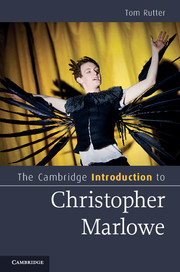Book contents
- Frontmatter
- Contents
- Illustrations
- Preface
- Key dates
- Chapter 1 Life and historical contexts
- Chapter 2 Tamburlaine, Parts One and Two
- Chapter 3 Doctor Faustus
- Chapter 4 The Jew of Malta and The Massacre at Paris
- Chapter 5 Edward II
- Chapter 6 Dido, Queen of Carthage and Marlowe’s poetry
- Chapter 7 Marlowe’s afterlives
- Bibliography
- Index
Chapter 6 - Dido, Queen of Carthage and Marlowe’s poetry
Published online by Cambridge University Press: 05 June 2012
- Frontmatter
- Contents
- Illustrations
- Preface
- Key dates
- Chapter 1 Life and historical contexts
- Chapter 2 Tamburlaine, Parts One and Two
- Chapter 3 Doctor Faustus
- Chapter 4 The Jew of Malta and The Massacre at Paris
- Chapter 5 Edward II
- Chapter 6 Dido, Queen of Carthage and Marlowe’s poetry
- Chapter 7 Marlowe’s afterlives
- Bibliography
- Index
Summary
The teaching of Marlowe tends to focus on the plays, in particular Tamburlaine, Doctor Faustus, The Jew of Malta and Edward II, with the result that his other works can get sidelined. This gives a misleading sense both of his range as a writer and of his literary influence, in that his non-dramatic works include perhaps the single most imitated lyric of the English Renaissance, ‘The Passionate Shepherd to His Love’, and Hero and Leander, one of the most celebrated erotic poems of the period. Even more marginalised, and no less unjustly, are his translations from Latin of Ovid’s Amores and of the first book of Lucan’s Pharsalia, two works that are stylistically unparalleled both in Marlowe’s writing and in early modern poetry generally and which help to give a sense of how Marlowe’s classical sources influenced his wider output. The current chapter will focus on all of these poems and on the play Dido, Queen of Carthage, a dramatisation of events from the first four books of Virgil’s Aeneid. Written for a company of child actors, it is unusual among Marlowe’s plays in featuring a female protagonist, and offers an ambiguous comment both on its main source and, perhaps, on the imperial designs of the Elizabethan state.
Ovid
The Amores, also known as the Elegies, are a collection of lyric poems by the Roman poet Ovid (43 bc–ad 17/18). In their surviving form they consist of three books of fifteen, nineteen and fourteen poems respectively, and their subject matter mainly concerns the speaker’s erotic intrigues with ‘Corinna’ and other women. One aspect of the Elegies has already been discussed in Chapter 1: their interest in poetry as a career, and their insistence both on the value of love poetry and on the fact that the poet will in due course produce ‘some greater work’. These statements appear in Ovid’s original and therefore prove nothing about when Marlowe worked on it; the most that can be said is that the Elegies are an apt work for a serious and self-conscious young poet to choose to translate. The fact that these explicit poems had not been translated before may also have made them appealing to an iconoclastic writer wishing to attempt something unprecedented. At any rate, critics of Marlowe’s Ovid frequently point to the awkwardness of some of the verse as evidence that it is an early work. In 1.4, for example, the speaker is asking his mistress not to let her husband be too physically affectionate to her at a banquet all three are to attend: ‘Thy bosom’s roseate buds let him not finger, / Chiefly on thy lips let not his lips linger’ (36–7). In the second line the combination of an initial stressed syllable with two pairs of stressed, alliterating syllables (‘lips let … lips linger’) makes the verse hard to pronounce.
- Type
- Chapter
- Information
- The Cambridge Introduction to Christopher Marlowe , pp. 99 - 117Publisher: Cambridge University PressPrint publication year: 2012



